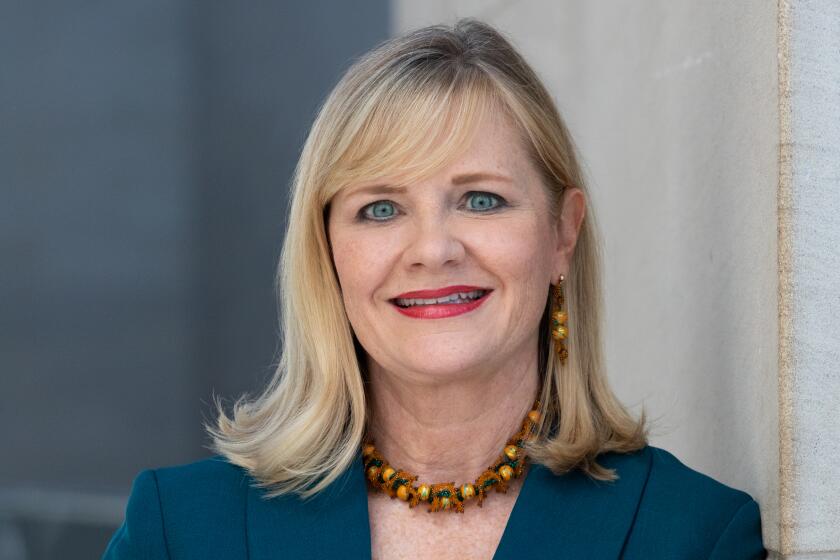SEX CHANGE GAVE LIFE TO REAL ‘EMILY’
Writing about women is easy, according to playwright Stephen Metcalfe.
The title character in his play “Emily,” who is a stockbroker, underwent a sex change from the early drafts through a delicate but actually very simple literary operation. Metcalfe went through the script and changed all the pronouns from “he” to “she.”
“As I was working on it, suddenly I got to the point one day, I just said this would be so much more interesting if this was a woman,” he said. “I thought, well, geez, can I write about women? And I said, ‘Oh, what the hell, let’s try!’ ”
Of course, more things changed as the writing went on. The little details that make women’s lives different from men’s started raising their heads to be dealt with, things like having children and coping with different pressures in the job marketplace. But Metcalfe said that there are still places in the script that were written from a strictly male point of view that are now veiled by feminine pronouns.
Those are the sections women in the readings and rehearsals have reacted to most, he said. “They come up to me and say, ‘How did you know that?’ It makes me laugh.”
“Emily” premiered Friday night at the Old Globe Theatre, the third Metcalfe play produced by the Old Globe in as many seasons. The New York writer’s work is so popular here that the Globe will present a fourth Metcalfe play next season, a West Coast premiere of “The Incredibly Famous Willy Rivers.”
With HBO airing his hourlong drama, “Half a Lifetime,” (the next showing is Tuesday) and North Coast Repertory Theatre in Solana Beach producing nearly as many of his plays as the Globe, it is not difficult for local fans to immerse themselves in Metcalfe mania.
Perhaps we’re fortunate the 33-year-old playwright set aside his acting aspirations for a writing career 10 years ago. Not only is he supplying dozens of regional theaters around the country with plays that light the stage with quiet displays of human bonding, trust and compassion, but he also is beginning to spread those same rare qualities to his work for television, and someday, he hopes, to the film industry.
So far, none of his screenplays has been produced, but he still hopes a film version of “Strange Snow” (renamed “Jackknife”) will extend the life of its heart-winning main character, a Vietnam veteran named Megs.
It’s hard to define the humanistic quality that makes a Metcalfe play special despite his preference for simple, contemporary plots. In “Strange Snow,” the essence that seeped through was the healing balm of friendship, of camaraderie. “Half a Lifetime” wanders through similar emotional terrain.
“Vikings,” offered last year by the Globe and North Coast Rep, explores the unspoken strength of family, a play Metcalfe calls his only “somewhat autobiographical” work. The grandfather, Yens, is based loosely on his grandmother, and “there are a lot of Danes in my family,” he said.
Mostly his ideas “just seem to sort of suggest themselves.”
His first inspiration for “Emily” came from his circle of stockbroker, banker and lawyer friends, who told Metcalfe an anecdote about a man so afraid of relationships that he would “freak out” and quickly propose marriage to remove himself from any commitment. The women would always say no, he would feign hurt, and then safely disappear.
“You have to realize he usually freaked out after about a week and a half. Whether this is even a true story, I don’t know, but I thought it was one of the funniest things I had ever heard,” he said.
Metcalfe has been in residence here to do rewrites and generally assist artistic director Jack O’Brien, who is staging “Emily.” The playwright is very pleased with the Globe’s professionalism.
“I’ve never seen my plays as well-produced anywhere as they are here . . . that’s not talking about directing or anything like that, even though the directing has been absolutely wonderful,” he said. “I mean, they are just so physically beautiful. You really are so aware of the collaborative aspect of theater when all of a sudden you have props giving you things that take your breath away and costumes having exactly the right touch and flare. . . . It’s really something special.”
As much as he enjoys San Diego and the Old Globe, Metcalfe disagrees with those who suggest that regional theaters should officially--and financially--”adopt” writers they favor.
“Yes, they could have me here and pay me a stipend and I could sit and do the work that I do anyway, and yet to me, more important than any money they might pay me is the commitment to production. I don’t think you can demand that of any theater,” he said. “Ultimately your work is what demands it and not any sense of who you are or the fact that you write plays.
“I’m almost kind of getting sick of hearing these playwrights complaining all the time. I don’t think anybody owes us anything. All they really owe anything to is your work--your work merits that attention or it doesn’t.”
Much more than whether or not he is making a decent living (he is, thanks to movie work and regional theaters), or what critics think of his plays (they like them), Metcalfe is concerned about his audiences.
“One of the things I love about the theater is (that) ultimately the final ingredient in the mix is the audience. I think the sense of ‘event’ inherent in the theater comes from all these people coming to one place to sit and, boom, the lights go down and it begins.
“I hope people enjoy the event of one of my plays. At the same time, I hope that they come out maybe having felt something and maybe having something to think about . . . maybe the play is the tip of the iceberg and then they go home and discover what’s beneath the surface.”
More to Read
The biggest entertainment stories
Get our big stories about Hollywood, film, television, music, arts, culture and more right in your inbox as soon as they publish.
You may occasionally receive promotional content from the Los Angeles Times.






